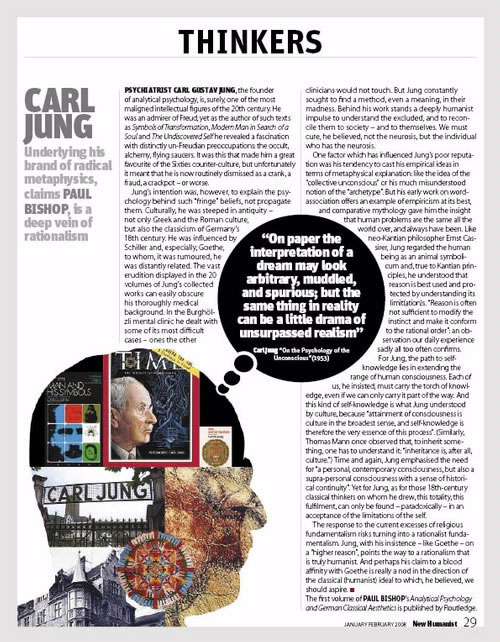Psychiatrist Carl Gustav Jung, the founder of analytical psychology, is, surely, one of the most maligned intellectual figures of the 20th century. He was an admirer of Freud, yet as the author of such texts as Symbols of Transformation, Modern Man in Search of a Soul and The Undiscovered Self he revealed a fascination with distinctly un-Freudian preoccupations: the occult, alchemy, flying saucers. It was this that made him a great favourite of the Sixties counter-culture, but unfortunately it meant that he is now routinely dismissed as a crank, a fraud, a crackpot – or worse.
 Jung’s intention was, however, to explain the psychology behind such “fringe” beliefs, not propagate them. Culturally, he was steeped in antiquity – not only Greek and the Roman culture, but also the classicism of Germany’s 18th century. He was influenced by Schiller and, especially, Goethe, to whom, it was rumoured, he was distantly related. The vast erudition displayed in the 20 volumes of Jung’s collected works can easily obscure his thoroughly medical background. In the Burghölzli mental clinic he dealt with some of its most difficult cases – ones the other clinicians would not touch. But Jung constantly sought to find a method, even a meaning, in their madness. Behind his work stands a deeply humanist impulse to understand the excluded, and to reconcile them to society – and to themselves. We must cure, he believed, not the neurosis, but the individual who has the neurosis.
Jung’s intention was, however, to explain the psychology behind such “fringe” beliefs, not propagate them. Culturally, he was steeped in antiquity – not only Greek and the Roman culture, but also the classicism of Germany’s 18th century. He was influenced by Schiller and, especially, Goethe, to whom, it was rumoured, he was distantly related. The vast erudition displayed in the 20 volumes of Jung’s collected works can easily obscure his thoroughly medical background. In the Burghölzli mental clinic he dealt with some of its most difficult cases – ones the other clinicians would not touch. But Jung constantly sought to find a method, even a meaning, in their madness. Behind his work stands a deeply humanist impulse to understand the excluded, and to reconcile them to society – and to themselves. We must cure, he believed, not the neurosis, but the individual who has the neurosis.
One factor which has influenced Jung’s poor reputation was his tendency to cast his empirical ideas in terms of metaphysical explanation: like the idea of the “collective unconscious” or his much misunderstood notion of the “archetype”. But his early work on word-association offers an example of empiricism at its best, and comparative mythology gave him the insight that human problems are the same all the world over, and always have been. Like neo-Kantian philosopher Ernst Cassirer, Jung regarded the human being as an animal symbolicum and, true to Kantian principles, he understood that reason is best used and protected by understanding its limit(ation)s. “Reason is often not sufficient to modify the instinct and make it conform to the rational order”: an observation our daily experience sadly all too often confirms.
For Jung, the path to self-knowledge lies in extending the range of human consciousness. Each of us, he insisted, must carry the torch of knowledge, even if we can only carry it part of the way. And this kind of self-knowledge is what Jung understood by culture, because “attainment of consciousness is culture in the broadest sense, and self-knowledge is therefore the very essence of this process”. (Similarly, Thomas Mann once observed that, to inherit something, one has to understand it; “inheritance is, after all, culture.”) Time and again, Jung emphasised the need for “a personal, contemporary consciousness, but also a supra-personal consciousness with a sense of historical continuity”. Yet for Jung, as for those 18th-century classical thinkers on whom he drew, this totality, this fulfilment, can only be found – paradoxically – in an acceptance of the limitations of the self.
The response to the current excesses of religious fundamentalism risks turning into a rationalist fundamentalism. Jung, with his insistence – like Goethe – on a “higher reason”, points the way to a rationalism that is truly humanist. And perhaps his claim to a blood affinity with Goethe is really a nod in the direction of the classical (humanist) ideal to which, he believed, we should aspire.

